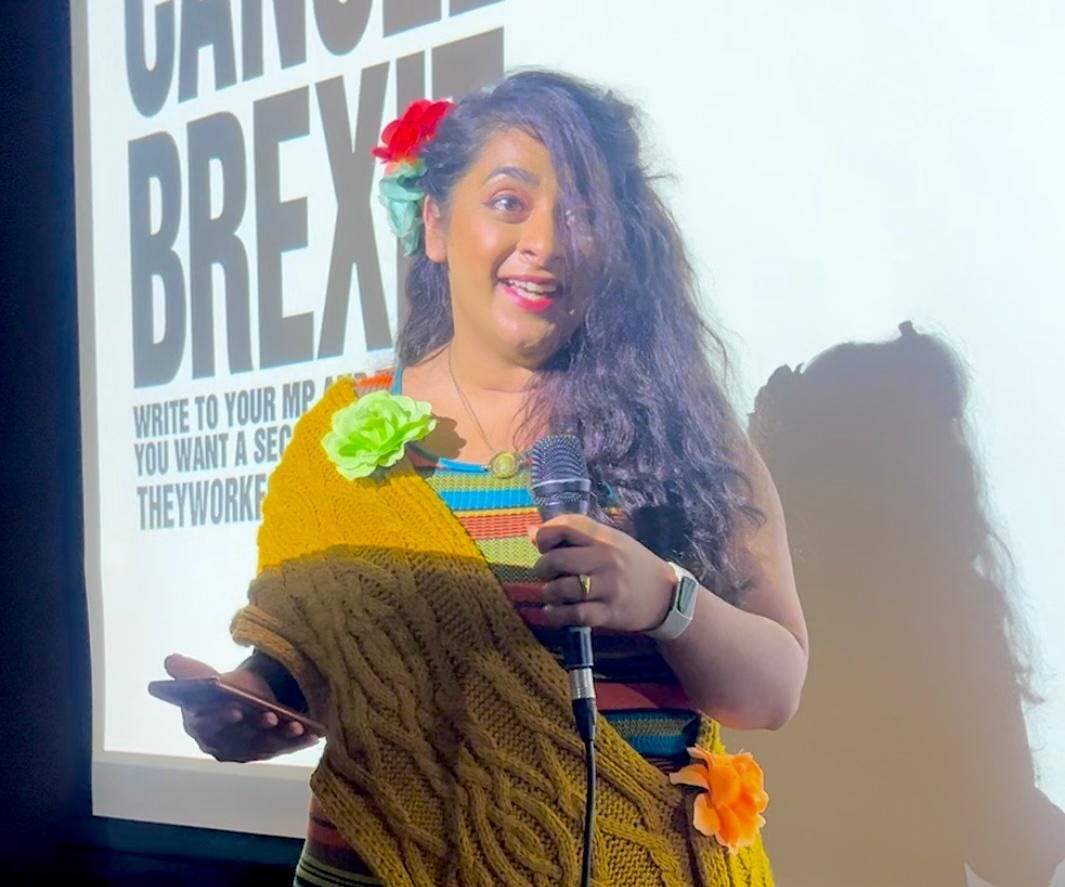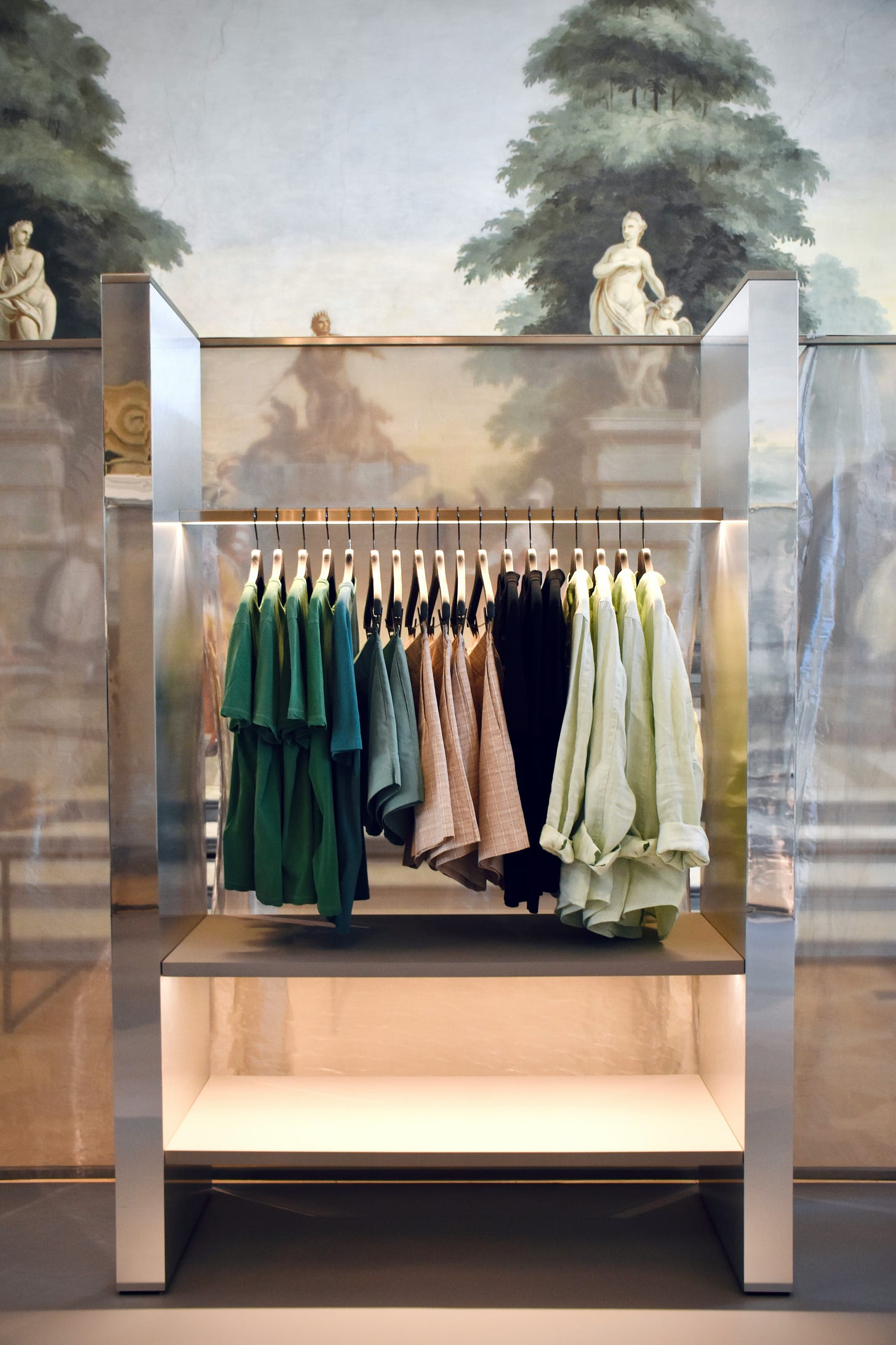A Thread of Sustainability: Weaving Ethical Futures in Fashion
Also this week: A glimpse at our London Fashion Week highlights
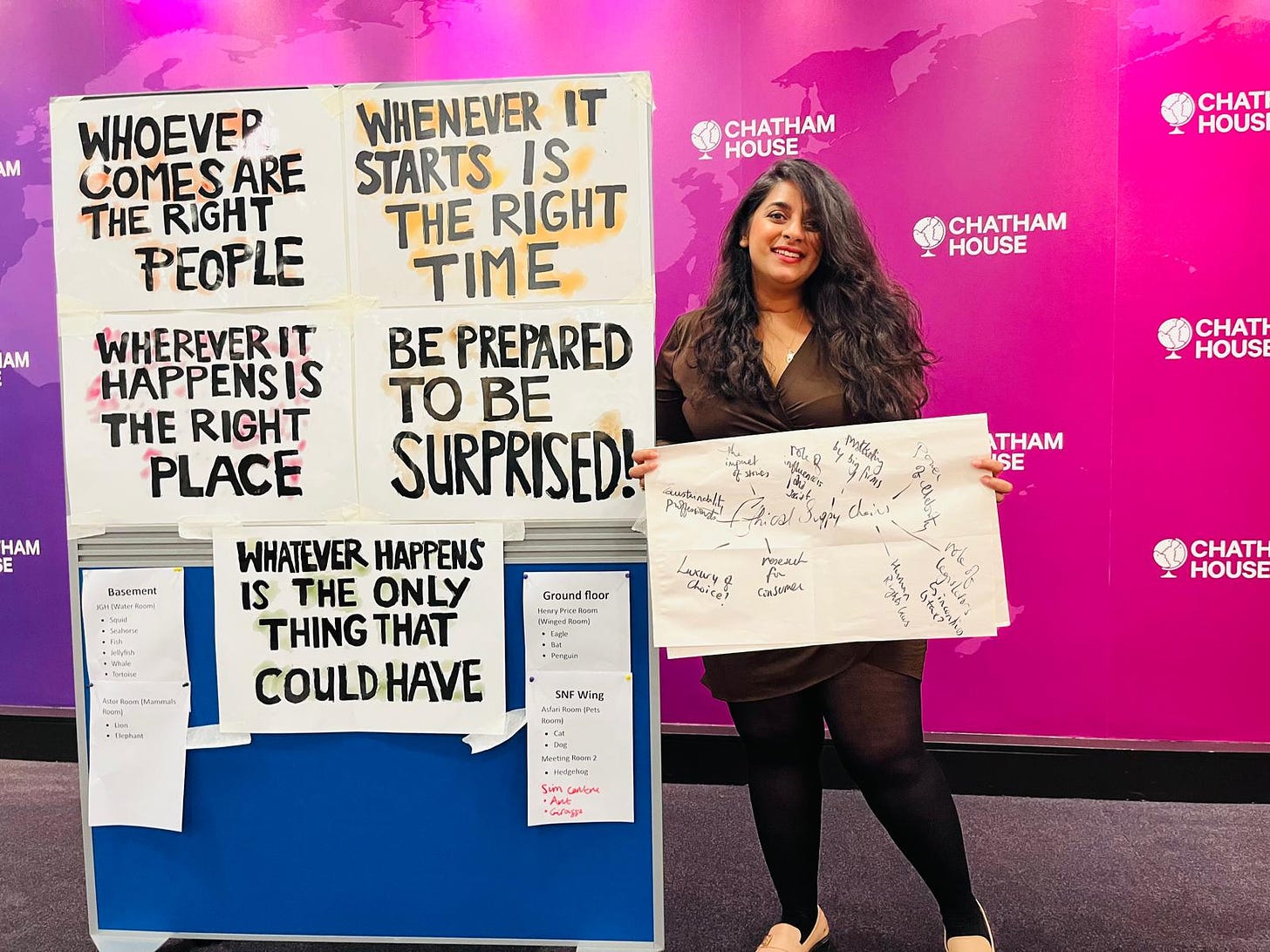
Words by Michelle Kazi
There is a common thread running through the heart of today’s global conversations: the need for a fairer, more sustainable future. From Chatham House's Unconference to the recent Fashion Declares: Regenerative Fashion Futures 2024, and London Fashion Week's Brazil: Creating Fashion for Tomorrow, this theme is coming to life in new and inspiring ways.
At the Unconference hosted by Chatham House, I had the privilege of not only attending but leading discussions. The freedom to steer conversations in smaller breakout circles offered a unique space to delve into critical issues. The session I led on ethical supply chains became a passionate discussion about accountability, transparency, and the human cost hidden in the threads of fast fashion. From garment workers to consumers, ethical responsibility rests on every step of the chain, and the participants in that room seemed united in a mission: to do better.
Yet, perhaps the most engaging conversation of the day was around what I called the “sustainability paradox”—a stark look at the world of hyper-consumerism. Despite growing consumer awareness of climate change, ethical fashion, and environmental degradation, the appetite for fast fashion continues to grow. How do we reconcile the rising consciousness with actions that often counter those very principles? The room was buzzing with ideas, from AI-driven consumer education to incentivising circular fashion. What became clear is that the challenge is not just one of awareness but of systemic shifts—finding a way to make doing the right thing easier, more accessible, and more rewarding.
Outside of the sessions I led, I participated in discussions on AI, climate change, and net-zero goals—a sweeping exchange of ideas ranging from how artificial intelligence can monitor supply chains to the urgent need for global cooperation in reaching carbon neutrality. The Unconference was, in essence, a powerful illustration of how global issues intersect, and how collaboration—across industries, sectors, and countries—will be key to accelerating a fair and sustainable future.
Just days later, I attended the Fashion Declares: Regenerative Fashion Futures 2024 event. Here, the ideals discussed at the Unconference came to life through concrete examples. This was not just a room full of aspirations—it was filled with action. Designers, policymakers, and activists came together to show how ethical practices can work in harmony with creativity and commerce. The event underscored that sustainable fashion is not an unattainable ideal but a necessary and achievable goal. It is about creating business models that value both planet and people. I was particularly struck by how regenerative fashion—the process of replenishing resources rather than depleting them—was being celebrated and embraced as the future of fashion. The energy in the room was palpable, as if everyone had collectively decided: it can be done, and we are doing it.
The journey didn’t end there. London Fashion Week saw the Brazil: Creating Fashion for Tomorrow showcase, where sustainable and ethical garments from Brazil were celebrated. This was more than just a runway—it was a testament to how global collaboration can foster change. Ethical and sustainable practices were not just words; they were beautifully woven into the fabrics, with every garment telling a story of responsible craftsmanship and conscious design. It was a celebration of how fashion can honour both heritage and innovation while respecting the environment.
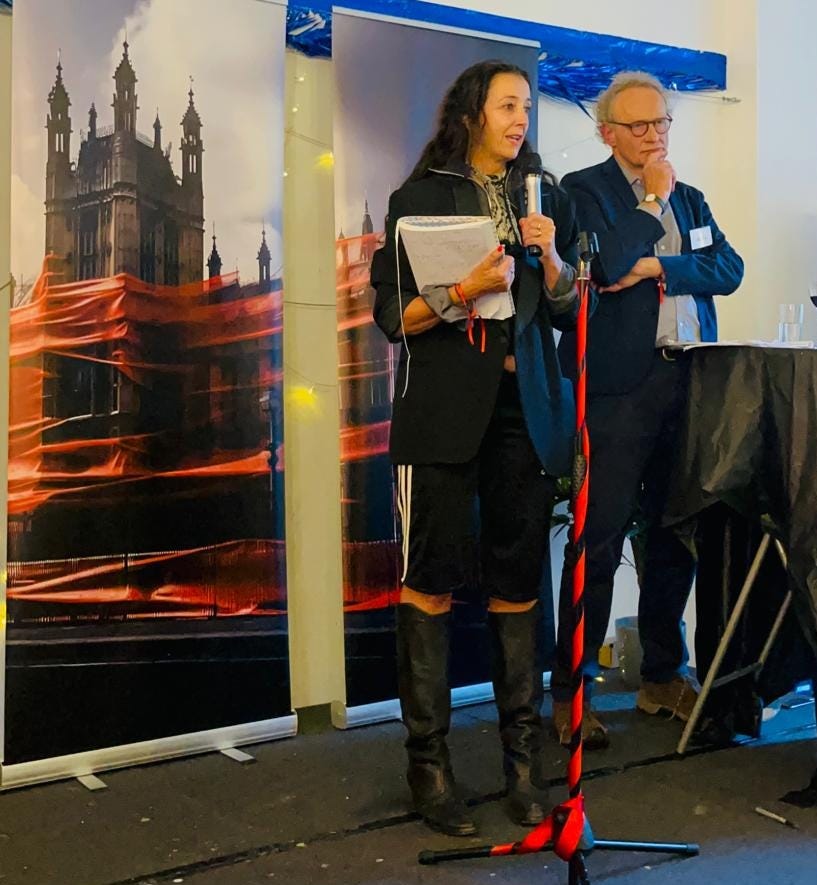
As I reflect on these inspiring moments, I can't help but recall the "Cut the Red Tape" event I also attended last week. Organised by Creative Powerhouse, the campaign is pushing for essential reforms to tackle the logistical and bureaucratic barriers that UK creatives face post-Brexit. From visa issues to trade restrictions, the campaign's goal is clear: to enable the UK’s creative sector to flourish across Europe. I couldn’t agree more that coming together as a creative sector is key to breaking down these barriers and making sure our voices are heard, especially in these turbulent post-Brexit times.
As part of our advocacy work at Fashion Roundtable, I was also invited to speak at London Fashion Week at an event hosted by Katharine Hamnett called "Fashion Hates Brexit". It was an eye-opening evening filled with political slogans, t-shirts, and urgent discussions about the future of the fashion industry in a post-Brexit world. During the event, I urged everyone to engage constructively with the new government. While Brexit has undoubtedly been damaging to the industry, the new administration is only two months in, and we need to work together to find solutions.
I emphasised that it’s not about cancelling Brexit because, frankly, we can’t—it’s happened. Instead, it’s about making the post-Brexit landscape work by constructively engaging with the EU and ensuring that the creative sector thrives. Whether it's visa-free travel for young professionals or cutting red tape for creatives, we must collaborate to create a workable and sustainable future for the UK fashion industry. We can’t afford to let Brexit stifle our progress toward a sustainable future in fashion; we must collectively push for the changes that will enable our industry to flourish in this new reality.
Together, these events paint an inspiring picture of what is possible when industry leaders, policymakers, and creatives come together to reimagine the future. What strikes me most is the momentum that is building. From high-level policy discussions to grassroots movements, the desire for a sustainable fashion industry is growing stronger by the day.
As the conversations at the Unconference and Fashion Declares revealed, we are not there yet. Challenges remain, from addressing consumer habits to restructuring supply chains. But, as the Brazil showcase reminded us, change is happening—one stitch at a time.
Fashion has always had the power to influence society, to reflect culture, and to drive trends. Now, more than ever, it has the power to lead the charge towards a more sustainable, ethical, and fair future. If we can weave together the insights, ideas, and innovations from these events, the future of fashion—and indeed, our planet—looks hopeful.
Let’s not let this thread unravel.
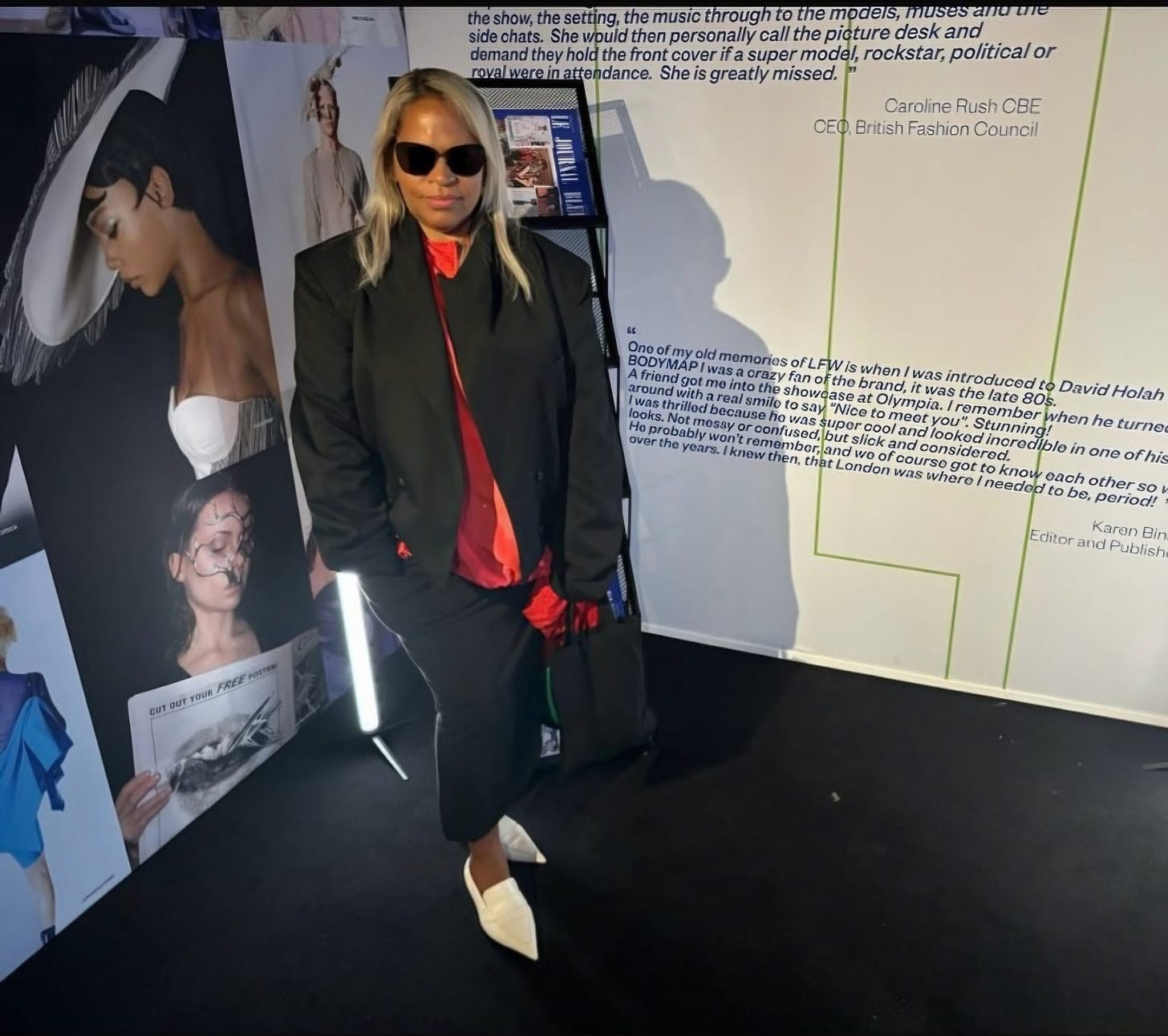
40 years of London Fashion Week; See our highlights on Instagram and TikTok
Watch our Fashion Director, Karen Binns, reflect at the Sarah Mower x Robin Derrick exhibition celebrating 40 years of London Fashion Week here
Our Founder & CEO, Tamara Cincik, loved Paolo Carzana’s use of natural dyes and recycled & repurposed materials in this sustainable collection. See Tamara’s recap of the show here
Karen’s remarks on Chet Lo’s runway “proud of our New Gen designer, he stays consistent and continues to grow in his perspective of a collection into new markets”. Take a look at his show here
Bath Fashion Festival, 21st - 22nd September 2024
A brand new festival this year, the Bath Fashion Festival will be coming to the Holburne Museum from 21st – 22nd September.
This groundbreaking two-day event, promises to invigorate the global fashion industry by bringing together renowned designers, influencers, and fashion enthusiasts for an immersive and unforgettable experience.
The festival will feature a showstopping catwalk, interactive experiences, pop-up designer shops, and panel discussions focusing on current fashion trends and sustainability. The BFF has already secured an impressive lineup of contributors, including Vivienne Westwood, Scamp and Dude, Erin O’Connor, Bay Garnett, Ruth Crilly, Manolo Blahnik and Sky Diamond, among others.
Guests will have the opportunity to engage with industry icons, attend expert panel talks, and participate in workshops led by leading brands and designers.
The BFF is committed to promoting environmentally responsible fashion practices, with dedicated discussions and an education area focused on sustainable fashion. The festival aims to inspire positive change in the industry, moving beyond conversation to actionable steps towards a more sustainable future.
Sustainability is a core focus of the event. BFF are committed to highlighting a fashion industry that values ethical production, eco-friendly practices, and conscious consumerism. Throughout the festival, you’ll find a strong emphasis on the future of sustainable design, with brands and designers in conversation about how to create fashion that respects both people and the planet.
The full event programme can be found here
The Good Clothes Show, Birmingham 20th - 22nd September 2024
There’s a new event on the horizon that promises to transform the way we think about fashion entirely. The Good Clothes Show, taking place from September 20th to 22nd, 2024, at Birmingham’s National Exhibition Centre (NEC), isn’t just another fashion show — it’s a sartorial shift. The runway is being reimagined and sustainable style, not fleeting trends, will steal the spotlight.
A brand-new event in the UK fashion calendar, it is already drawing inevitable comparisons to the former Clothes Show Live, which ran for two decades and gave fashion lovers direct access to the latest trends.
But this new event is launching with a more urgent and meaningful mission. At a time of rising awareness around climate change and the role fashion plays, from raw materials through to waste, The Good Clothes Show aims to inspire a shift in mainstream fashion by creating a much-needed bridge between style and sustainability.
Carry Somers, co-founder of Fashion Revolution and Lead Advisor for the show, underscored the significance of the event, stating: “The Good Clothes Show will draw a new line in the sand for consumer fashion events in the UK, signalling a wholesale change in the way we all view fashion and underpinning the need to make better shopping choices. The event will celebrate the designers and artisans who are changing the face of the fashion industry in the UK and beyond, whilst giving space for collaboration, innovation, learning, and empowerment.”
The show offers something for everyone, whether you’re a seasoned second-hand shopper or simply exploring more sustainable options. Highlights include:
Exhibitors: It wouldn’t be a clothes show without shopping, but this is something entirely different: a broad curation of lower-impact fashion and accessories from preloved and vintage, responsible independent labels, artisans, makers, and more, embracing the full spectrum of fashion from street style to luxury.
The Big Swap: Swap preloved fashion for something new-to-you at the Global Fashion Exchange Swap Shop.
Styling Sessions and Customisation Workshops: Learn how to upcycle, repair, and restyle your wardrobe with hands-on advice from experts.
Book Signings, Talks and Panel Discussions: with over 50 speakers across the three days, including Patrick Grant, Great British Sewing Bee presenter and author of the recent best-seller Less: Stop Buying So Much Rubbish, climate justice activist Tori Tsui, & sustainability influencer Emma Slade Edmonson.
Workshops: Workshops will be led by The Great British Sewing Bee’s Jen Hogg and Mercedes Ferrari Plumridge.
Runway Shows: The runway will spotlight designers who are pushing the boundaries of sustainable fashion, proving that ethics and style can go hand in hand.
So get ready to experience fashion like never before. The Good Clothes Show will prove that fashion’s future isn’t just about what’s on trend—it’s about what’s right for the world.
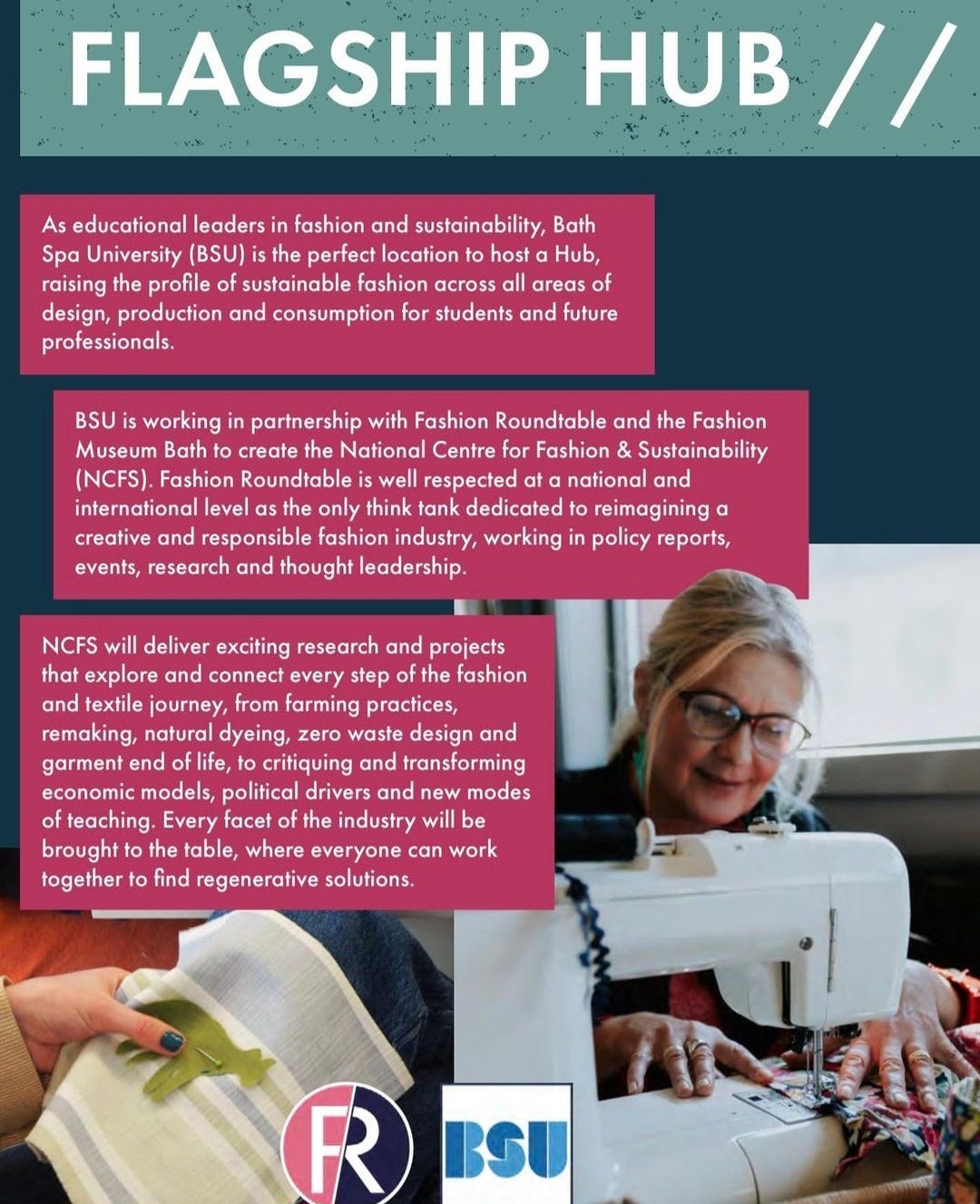
Sustainable Fashion Week, 20th - 29th September 2024
Sustainable Fashion Week is back for it’s fourth year, celebrating the Power of Repair. Spreading out across the UK, SFW 2024 is an explosion of community action. Uniting the community in taking creative action, to change the fashion system from the bottom up.
The programme is split between their Hubs and their Fringe, with all activities being designed and delivered by brilliant and inspiring people in the community.
The Flagship Hubs partners this for this years SFW programme are Bath Spa University and the new National Centre for Fashion and Sustainability .
A partnership between Bath Spa University, Fashion Roundtable and the world-renowned Fashion Museum Bath, the National Centre for Fashion and Sustainability will create a space where leading thinkers, learners, businesses and communities can connect and drive the fashion and textile industry toward new, regenerative practices that will be healthy for people and the planet.
Ticket Links:
All tickets are available to book on the Yuup platform.
Nettle Dress Film Screening + Q&A




